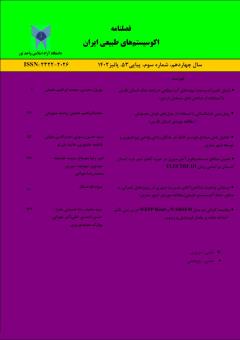سنجش وضعیت شاخصهای مدیریت شهری در پروژههای عمرانی به منظور حفظ اکوسیستم طبیعی (مطالعه موردی: شهر ساری)
محورهای موضوعی : برنامه ریزی شهری
1 - کارشناسی ارشد عمران سازه، دانشگاه غیرانتفاعی صالحان قائمشهر، ایران
کلید واژه: شاخص های مدیریت شهری, پروژههای عمرانی, اکوسیستم طبیعی, شهر ساری,
چکیده مقاله :
یکی از وظایف اصلی مدیریت شهری زمینهسازی برای ارتقای کیفیت زندگی شهروندان است که بخشی از این ارتقای کیفیت از طریق اجرای طرحهای عمرانی در راستای حفظ اکوسیستم طبیعی مقدور است. هدف از پژوهش حاضر سنجش وضعیت شاخصهای مدیریت شهری در پروژههای عمرانی به منظور حفظ اکوسیستم طبیعی در شهر ساری است. امروزه با رشد و گسترش شهرها مخصوصا کلانشهرها در کشورهای جهان سوم، مشکلات زیادی از جمله مسئله مدیریت شهری به خوبی نمایان شده است. در این زمینه در ایران هم این مسأله مخصوصا در شهرهای بزرگ مانند ساری خود را به اشکال مختلف نمایان ساخته است. پژوهش حاضر توصیفی و از شاخه پیمایشی است. از لحاظ جمع آوری دادهها، پژوهشی میدانی (از طریق پرسشنامه) میباشد. جامعه آماری شامل متخصصان و کارشناسان در زمینه مدیریت و عمران شهری هستند که تعداد 55 نفر به صورت نمونهگیری خوشهای هدفمند از این جامعه انتخاب شدند. برای تجزیه و تحلیل دادهها از نرمافزار Expert choice استفاده شده است. یافتهها نشان داد که مدیریت کارآمد و سیستم مدیریتی مناسب به عنوان اولین شاخص و پس از آن به ترتیب توان مالی و پشتیبانی، میزان تحصیلات، رشته تحصیلی و تجربه اجرائی کادر متخصص، قیمت پیشنهادی، داشتن تجهیزات و ماشینآلات آماده به کار یا در دسترس و آموزش مستمر کارکنان بر تحقق و بهبود شاخصهای مدیریت شهری در پروژههای عمرانی شهر ساری میباشد. نتایج نشان داده است که با مقایسه وضعیت شاخصهای مدیریت شهری در پروژههای عمرانی شهر ساری با استانداردهای بینالمللی، میتوان وضعیت مدیریت شهری را ارزیابی کرد و بهبود آن را پیشنهاد داد.
One of the main tasks of urban management is to create a foundation for improving the quality of life for citizens, part of which can be achieved through implementing civil projects aimed at preserving natural ecosystems. The aim of this research is to assess the status of urban management indicators in civil projects for the preservation of natural ecosystems in Sari city. With the growth and expansion of cities, especially in third-world countries, various problems including urban management issues have become apparent. This issue has also manifested itself in Iran, particularly in large cities like Sari. The present research is descriptive and survey-based. In terms of data collection, it is a field study (using questionnaires). The statistical population includes specialists and experts in the field of urban management and civil engineering, with a sample of 55 individuals selected through cluster sampling from this population. Expert Choice software was used for data analysis. The findings indicate that efficient management and appropriate management systems are the primary indicators, followed by financial capacity and support, level of education, field of study, and executive experience of specialized staff, proposed price, availability of equipment and machinery ready for use, and continuous training of employees contribute to achieving and improving urban management indicators in civil projects in Sari city. The results show that by comparing the status of urban management indicators in civil projects in Sari city with international standards, the urban management status can be evaluated and suggestions for improvement can be made.


